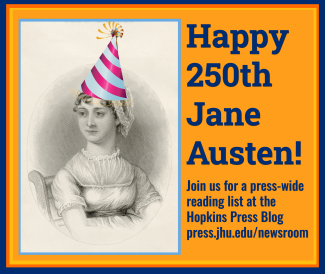Newsroom
Filter
Hopkins Press Welcomes New Journal: Cusp
Continuing our celebration of University Press Week, today we showcase what's #NextUP in Journals with the launch announcement of the newest title in the Hopkins Press Journals catalog: Cusp: Late 19th-/Early 20th-Century Cultures.

Getting to Know Camp Followers
by Paula Backscheider, author of Women in Wartime: Theatrical Representations in the Long Eighteenth Century Getting to Know Camp Followers When I began the research for Women in Wartime, I was simply looking at how wartime women were represented on the stage...

The Green New Deal is Alive and Well
The climate and health care bill signed into law in August has a familiar ring. It is remarkably green-new-dealish. The Green New Deal (GND), which was unfairly and incorrectly characterized by some as “socialist” and “extreme” when introduced in 2019, is...

Michael P. Steinberg on Richard Wagner and German Antisemitism
The Spring 2022 issue of Social Research: An International Quarterly includes a paper by Michael P. Steinberg, a professor of History, Music, and German Studies at Brown University. The article, titled "The Narcissism of Major Differences: Richard Wagner and...

Arizona Quarterly publishes special issue highlighting later work of Adrienne Rich
The Autumn 2022 issue of Arizona Quarterly: A Journal of American Literature, Culture, and Theory is a special issue devoted to the later work of American poet, essayist, and feminist Adrienne Rich. While Rich's early work garnered much literary attention, her...

A Sandman Syllabus
"Stories are like spiritual currency.” - The Sandman: Book of Dreams The new Netflix adaptation of Neil Gaiman's The Sandman is getting a lot of positive attention from critics and fans alike. The original comic began in January 1989 and ran for 75 issues...

Military Recruiting
by Paula Backscheider, author of Women in Wartime: Theatrical Representations in the Long Eighteenth Century A student wrote of my book, “What I found most interesting were … resonant examples of wartime women and the similarities that continue to be...

Who Makes Meaning? What Does My New Book Do?
by Paula Backscheider, author of Women in Wartime: Theatrical Representations in the Long Eighteenth Century Last night UPS delivered a book including an essay of mine. The contributor’s list gave my title as Wartime Women: Intimate Conscripts on the British...

Historian's High-Tech X-Ray of Medieval Book Reveals Mysterious Object
The Spring 2022 issue of Digital Philology: A Journal of Medieval Cultures includes a fascinating paper by J.D. Sargan, Jessica J. Lockhart, Andrew J. Nelson, D.L. Meert-Williston, and Alexandra Gillespie. Dr. Sargan and his team describe the results of a new...

(Re)considering the “Alternatives”
Late in the last century, a long-form essay by Arnold Relman, former editor-in-chief of the New England Journal of Medicine, appeared in The New Republic (December 13, 1998). Titled “A Trip to Stonesville: Andrew Weil, the Boom in Alternative Medicine, and the...

